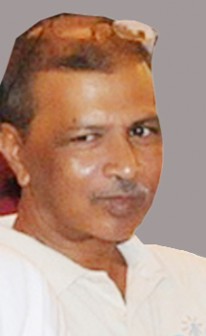The much anticipated National Communications Network (NCN) debate of presidential candidates, which was scheduled for today, has been cancelled since only the PPP/C confirmed its participation and NCN maintains that it has been carrying all advertisements in response to one party’s contention of bias.
This is according to Programme Manager of NCN Martin Goolsarran in a letter to the editor yesterday.
He said the Alliance for Change (AFC) and A Partnership for National Unity (APNU) indicated their inability to participate in the debate, “citing various reasons, [which] we believe are not substantial….” Goolsarran said that there has been no response from The United Force (TUF).

Presidential candidate of APNU David Granger, in a letter to the NCN programme manager early last week, said his party was not prepared to take part in the engagement unless issues of access to the state media and bias are addressed by the station.
“As you are aware, A Partnership for National Unity has been obliged to make formal complaints about the lack of access to, and the bias displayed by, all state-owned media, including NCN. There has been no assurance from you that these matters – access and bias – are being addressed,” Granger said in his letter.
Granger confirmed his readiness to participate once NCN demonstrated a willingness to address these issues.
In a letter to Goolsarran on November 9, AFC presidential candidate Khemraj Ramjattan cited the channel’s refusal to air advertisements as a sore point and one which precluded the party’s participation in the debate.
“As the national television station, funded by the taxpayers of Guyana with a specific mandate at elections time to provide fair and equitable access to all contesting political parties we find your actions totally unacceptable,” said Ramjattan in his letter.
“Therefore in all good conscience and given the events of the last week as stated above we would be unable to participate and feel confident that your format would treat us and all participants fairly, unless you can give us satisfactory assurances that this debate will be conducted in an impartial manner,” he said.
Ramjattan said too that in addition, the party made a commitment “several weeks ago” participate in the civil society/Merundoi debates. He said the party felt “that a civil society driven debate can better provide a fair and objective platform…” He also asked whether or not NCN considered how it could be involved in this civil society driven process, referring to the Merundoi engagement, which is also scheduled to take place this week.
Goolsarran said that given this situation, NCN regrets to advise that the much anticipated debate will not take place. “The company is further expressing its disappointment at this lost opportunity, especially when some of the parties are claiming lack of access to the network,” he said.
He said this claim was not true since “advertisements of all the parties are broadcast on the network.”
On November 1, NCN wrote to all of the contesting parties inviting them to the debate and spelling out the format and other relevant details.
The letter of invitation said the format of the debate was designed to allow the candidates to speak on policies and issues that their parties are concerned about and taking to the electorate. It aimed to provide an opportunity for them to respond and clarify issues that each of the candidates might raise.
The letter of invitation said that a moderator would have been designated to manage the debate and there would have been four journalists who would have been allowed to ask two questions each. Two of the journalists would have been from the state media and two from the private media. The duration of the debate would have been 90 minutes, NCN said and each candidate would have been given five minutes each to make an opening statement. A moderator would have asked two questions of each candidate and the period allotted for responses would have been 20 minutes. Questions from journalists and responses would have taken another 25 minutes, and then there would have been time for closing statements, each candidate being allotted five minutes.
A forum of a slightly different format took place at the University of Guyana last Thursday and saw all four presidential candidates presenting issues to the student body and faculty. At this forum, only students of the university could have asked questions and only four of those questions were allowed and answered.





